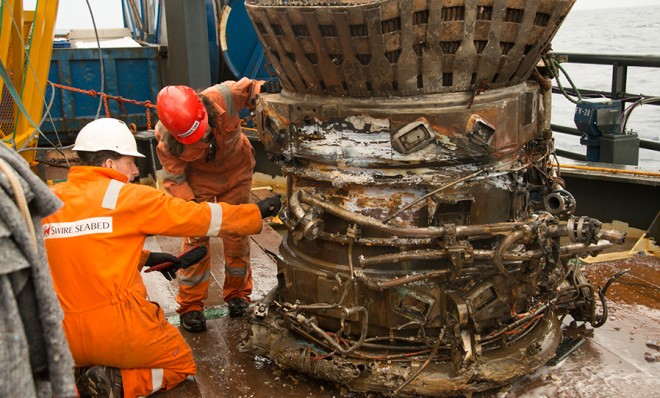Found: The space rockets that propelled Neil Armstrong to the moon
Amazon CEO Jeff Bezos' team of researchers fished the engines from the bottom of the Atlantic


A free daily email with the biggest news stories of the day – and the best features from TheWeek.com
You are now subscribed
Your newsletter sign-up was successful
Amazon CEO Jeff Bezos announced Friday that two rocket engines his team of researchers found earlier this year came from the Apollo 11 mission that put the first astronauts on the moon. The news was timely — Saturday is the anniversary of the historic first moon landing on July 20, 1969.
"Forty-four years ago tomorrow Neil Armstrong stepped onto the moon, and now we have recovered a critical technological marvel that made it all possible," Bezos wrote on his Bezos Expeditions blog.
The salvage team fished the two F-1 rocket engines off the bottom of the Atlantic in March. They knew they belonged to an Apollo-era Saturn V rocket, but weren't sure they would be able to determine which one, since the serial numbers appeared to have been worn away by four decades of saltwater corrosion. Take a look at the video of the underwater find:
The Week
Escape your echo chamber. Get the facts behind the news, plus analysis from multiple perspectives.

Sign up for The Week's Free Newsletters
From our morning news briefing to a weekly Good News Newsletter, get the best of The Week delivered directly to your inbox.
From our morning news briefing to a weekly Good News Newsletter, get the best of The Week delivered directly to your inbox.

Then one of the conservators, using a black light and a special lens filter, noticed the number "2044" stenciled in black paint on one of the thrust chambers. That number, Bezos said, corresponded to NASA number 6044, the serial number for F-1 Engine No. 5 from the Apollo 11 mission. A little more work by the team at the Kansas Cosmosphere and Space Center to remove corrosion uncovered a metal stamp that said "Unit No 2044," further confirming the ID.
The news gave chills to space junkies. "Welcome home, you fantastic chunk of metal," wrote Eric Mack at CNET.
For those who remember the excitement of the Apollo missions, this is indeed a welcome blast from the past. I got to watch the only night launch, Apollo 17. It turned the darkness into daylight, and made anything seem possible. Hard to believe we haven't been back.
Here's what that launch looked like:
A free daily email with the biggest news stories of the day – and the best features from TheWeek.com
Harold Maass is a contributing editor at The Week. He has been writing for The Week since the 2001 debut of the U.S. print edition and served as editor of TheWeek.com when it launched in 2008. Harold started his career as a newspaper reporter in South Florida and Haiti. He has previously worked for a variety of news outlets, including The Miami Herald, ABC News and Fox News, and for several years wrote a daily roundup of financial news for The Week and Yahoo Finance.
-
 The environmental cost of GLP-1s
The environmental cost of GLP-1sThe explainer Producing the drugs is a dirty process
-
 Greenland’s capital becomes ground zero for the country’s diplomatic straits
Greenland’s capital becomes ground zero for the country’s diplomatic straitsIN THE SPOTLIGHT A flurry of new consular activity in Nuuk shows how important Greenland has become to Europeans’ anxiety about American imperialism
-
 ‘This is something that happens all too often’
‘This is something that happens all too often’Instant Opinion Opinion, comment and editorials of the day
